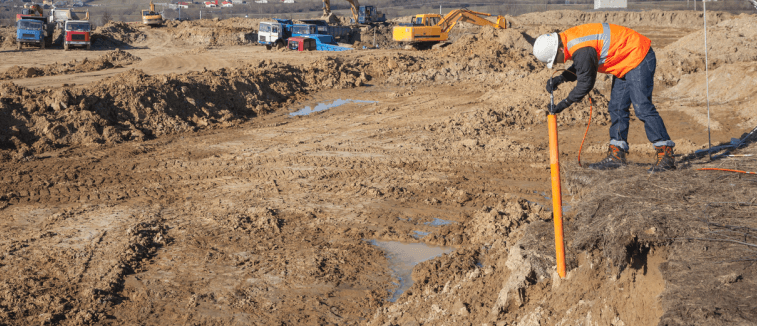Geotheta Things To Know Before You Get This
Geotheta Things To Know Before You Get This
Blog Article
The Only Guide to Geotheta
Table of ContentsExamine This Report about Geotheta7 Simple Techniques For GeothetaGeotheta Things To Know Before You BuyThe Definitive Guide for GeothetaGeotheta for Beginners

They conduct website examinations, accumulate examples, execute lab examinations, and assess data to assess the suitability of the ground for building and construction tasks - Consulting Engineer. Based upon their findings, geotechnical engineers offer referrals for structure layout, incline stability, keeping frameworks, and reduction of geotechnical threats. They team up with various other professionals, such as architects, structural engineers, and building groups, to ensure that geotechnical considerations are integrated right into the general task style and implementation
By analyzing the habits and buildings of dirt and rock, they can recognize prospective geotechnical risks such as landslides, soil settlement, or incline instability. Their proficiency helps prevent failings or crashes that can jeopardize lives and residential or commercial property. Here are some detailed duties and duties of a geotechnical designer: Site Investigation: Geotechnical engineers conduct website investigations to gather data on subsurface conditions.
They interpret the data to understand the residential or commercial properties and habits of the dirt and rock, including their stamina, leaks in the structure, compaction features, and groundwater conditions. Geotechnical Analysis and Layout: Geotechnical designers analyze the data collected during site investigations to evaluate the security and suitability of the site for construction projects. They perform geotechnical calculations and modeling to assess elements such as bearing capacity, negotiation, slope stability, side planet stress, and groundwater flow.
Some Known Details About Geotheta
Structure Style: Geotechnical designers play a crucial duty in creating foundations that can securely support the designated framework. They evaluate the dirt problems and load demands to determine the ideal foundation kind, such as shallow structures (e.g., footings), deep foundations (e.g (https://www.openstreetmap.org/user/geotheta)., heaps), or specialized techniques like soil renovation. They take into consideration aspects such as settlement limits, birthing capability, and soil-structure interaction to develop optimum foundation designs
They review building and construction plans, monitor website activities, and conduct area assessments to confirm that the design referrals are complied with. If unexpected geotechnical issues arise, they analyze the circumstance and offer recommendations for removal or modifications to the design. Threat Analysis and Mitigation: Geotechnical designers evaluate geotechnical hazards and threats connected with the project site, such as landslides, liquefaction, or soil disintegration.

Partnership and Communication: Geotechnical designers work carefully with various other experts associated with a task, such as designers, architectural engineers, and construction teams. Effective interaction and collaboration are vital to incorporate geotechnical considerations right into the overall task design and building and construction process. Geotechnical designers offer technological expertise, response questions, and make sure that geotechnical requirements are satisfied.
Facts About Geotheta Uncovered
Below are some kinds of geotechnical engineers: Structure Engineer: Structure engineers concentrate on making and examining structures for frameworks. They evaluate the soil conditions, tons needs, and site attributes to establish one of the most appropriate foundation type and style, such as superficial structures, deep foundations, or specialized methods like stack structures.
They assess the factors influencing slope security, such as dirt buildings, groundwater problems, and incline geometry, and create approaches to prevent slope failures and mitigate threats. Quake Designer: Quake designers focus on examining and creating frameworks to stand up to seismic pressures. They evaluate the seismic risk of a website, review dirt liquefaction capacity, and develop seismic layout criteria to ensure the safety and resilience of frameworks throughout earthquakes.
They perform area screening, gather samples, and analyze the accumulated information to more information characterize the soil homes, geologic formations, and groundwater problems at a site. Geotechnical Instrumentation Engineer: Geotechnical instrumentation designers concentrate on monitoring and gauging the habits of soil, rock, and frameworks. They set up and maintain instrumentation systems that check aspects such as soil negotiation, groundwater degrees, slope movements, and architectural displacements to assess efficiency and offer very early warnings of potential problems.
The Basic Principles Of Geotheta
They conduct examinations such as triaxial examinations, debt consolidation examinations, direct shear tests, and leaks in the structure examinations to collect data for geotechnical analysis and layout. Geosynthetics Engineer: Geosynthetics engineers specialize in the design and application of geosynthetic products, such as geotextiles, geogrids, and geomembranes. They use these products to enhance soil security, strengthen slopes, supply drain remedies, and control disintegration.
They have a tendency to be investigatory individuals, which suggests they're intellectual, introspective, and inquisitive. They wonder, systematic, rational, analytical, and sensible. Some of them are likewise social, suggesting they're kind, generous, participating, patient, caring, valuable, understanding, sensible, and friendly. Does this seem like you? Take our totally free career examination to find out if geotechnical designer is among your top job matches.
In the workplace atmosphere, geotechnical engineers utilize specialized software application tools to perform calculations, create layouts, and assess information. They prepare records, evaluation job requirements, connect with clients and staff member, and coordinate task tasks. The workplace setup offers a favorable atmosphere for research study, analysis, and partnership with various other experts associated with the task.
Not known Incorrect Statements About Geotheta
They regularly check out project websites to carry out website investigations, assess geotechnical conditions, and collect data for evaluation. These check outs entail traveling to various areas, in some cases in remote or difficult terrains. Geotechnical engineers might execute soil tasting, conduct examinations, and monitor building and construction activities to ensure that the geotechnical aspects of the job are being executed appropriately.
Geotechnical engineers additionally function in specialized geotechnical laboratories. In these centers, they perform experiments, perform examinations on dirt and rock samples, and evaluate the engineering buildings of the materials. Geotechnical research laboratory designers work extensively in these environments, managing screening tools, operating instruments, and tape-recording information. They team up with other laboratory personnel to make sure exact and dependable testing results.
Report this page